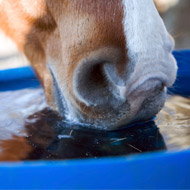Fatal disease discovered at Rio

One of the most common sources of glanders is the ingestion of contaminated food or water via discharge from the respiratory tract.
A rare but deadly equine disease has been discovered at the Deodoro Rio Olympic horse park, causing concern within the equestrian industry.
Horse & Hound reports that glanders has been found at the Deodoro Olympic Park in Rio, which the organisers kept hidden until last week.
The World Health Organisation for Animal Health (OIE) have criticised the Brazilian government for not being "more transparent about the situation".
Glanders is an infectious disease that mainly affects horses, characterised by swellings below the jaw and mucous discharge from the nostrils. The most common source of infection is the ingestion of contaminated food or water via discharge from the respiratory tracts or ulcerated skin lesions from carrier animals.
The disease was widespread in Great Britain in the nineteenth century and was finally eradicated from this country in 1928. However, cases of glanders can still be found in the Middle East, Asia, Africa and South America.
Deodoro is a military base which previously housed army horses until they vacated the site in February. Organisers issued a briefing note on Friday, 31 July explaining that one of the horses, now posted 600km away in Vitoria, was diagnosed with glanders in April. The authorities then undertook mass testing and in June, a further horse from the site tested positive, with another “inconclusive”.
Horse & Hound say that a further 584 locally-based horses are now being tested. The OIE has helped Rio with biosecurity arrangements and add that there is no risk to visiting horses.
FEI president Ingmar de Vosadded said: “MAPA [the Brazilian ministry of agriculture] has confirmed to the FEI that there is no threat to the test event nor to the horses that will compete. We are confident that everything is being handled correctly.”



 The BSAVA has opened submissions for the BSAVA Clinical Research Abstracts 2026.
The BSAVA has opened submissions for the BSAVA Clinical Research Abstracts 2026.